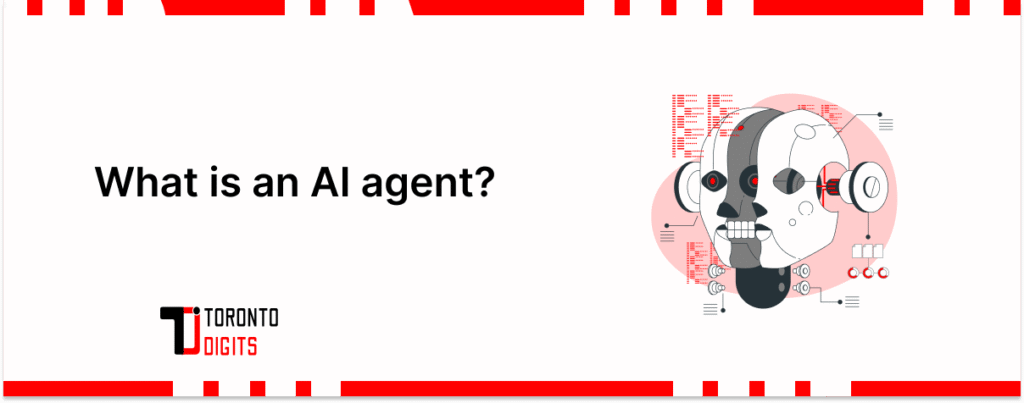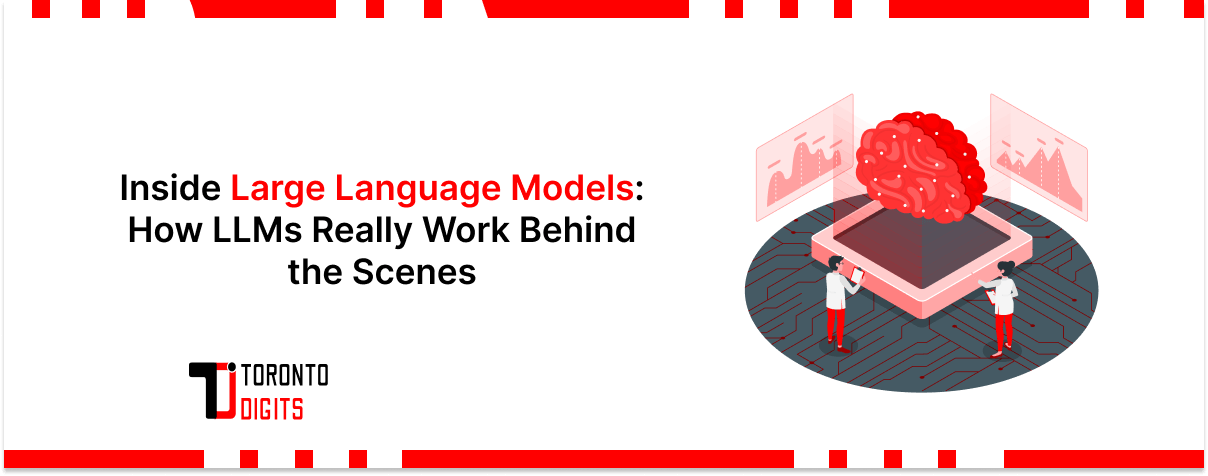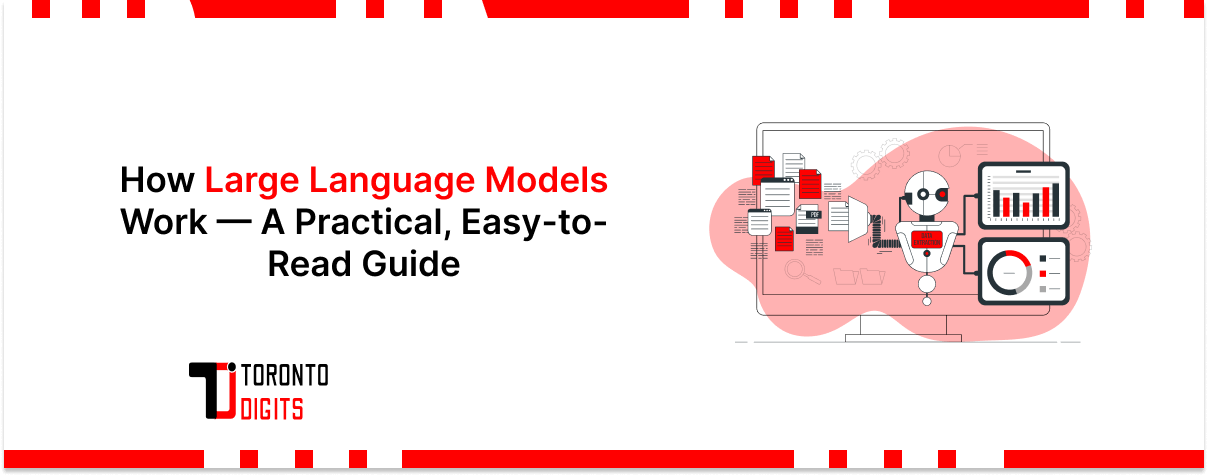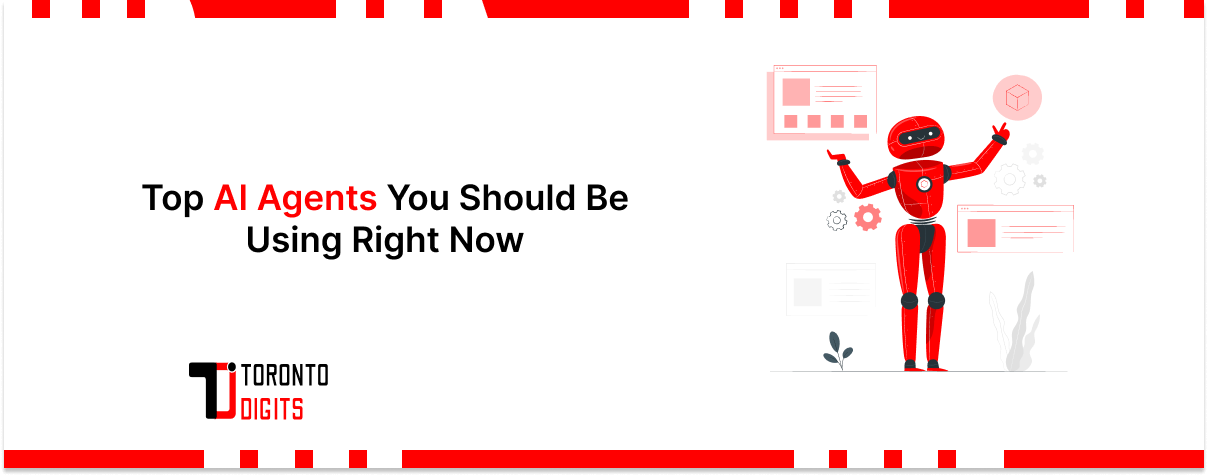AI agents are changing how we interact with technology. Instead of just following commands, these smart systems — from apps and business tools to connected devices — can now think a few steps ahead. They’re designed to make simple decisions, predict what you might need next, recommend helpful actions, automate repetitive tasks, and even identify ways to do things better.
In this post, we’ll break down how AI agents actually work, what makes them so powerful, and why they’re quickly becoming must-have partners for both businesses and everyday life.
What is an AI Agent?
AI agents are intelligent software systems that can think, act, and learn to complete tasks for people or organizations. Powered by artificial intelligence — including generative AI — these agents can understand their surroundings, make decisions, and improve through experience. They can process all kinds of information, from text and voice to images, video, and even code, allowing them to interact with the world in surprisingly human-like ways.
The smartest AI agents can hold conversations, reason through problems, and make choices on their own — skills that make them useful across almost every industry. You’ll find them in all sorts of forms: software assistants, automated business tools, physical robots, and even self-driving cars. For example, autonomous vehicles act as AI agents by using sensors, cameras, radar, and lasers to “see” their environment, interpret traffic conditions, and safely navigate from one place to another with little or no human help.
AI agents adapt their communication style depending on the situation. A customer service agent might chat with users through text, ask clarifying questions, and then pull data from multiple systems — such as order details, shipping updates, or weather conditions — to provide an accurate answer.
Experts believe AI agents are just getting started. Ethan Mollick, a professor at the Wharton School of the University of Pennsylvania, predicts that within five years, these digital helpers will be everywhere. “You’re more likely to run into an AI agent online than a person,” he says — and that future is coming faster than most people think.
How Do AI Agents Work?
AI agents are designed to make complex tasks easier by following a clear, step-by-step process. Here’s how it works:
1. Setting the Goal
Everything starts with an objective — a command or request from the user. The AI agent breaks that goal down into smaller, manageable steps, then maps out the best plan to reach the desired outcome efficiently.
2. Gathering Information
Next, the agent collects the data it needs to complete the job. This might mean searching the web, pulling details from databases, or even teaming up with other AI systems to fill in the gaps and improve accuracy.
3. Executing the Tasks
Once it has what it needs, the AI agent gets to work — completing each task one by one. Along the way, it evaluates progress, checks if the goal has been met, and, if necessary, creates new steps to fine-tune the results until the final objective is achieved.
In short, AI agents don’t just follow orders — they plan, learn, and adapt to deliver smarter, more efficient outcomes.

Key Characteristics of AI Agents
AI agents bring together several powerful technologies to understand, decide, and act intelligently. They might use machine learning to spot patterns in data, natural language processing (NLP) to understand and respond to human language, and data analytics to draw insights from massive databases or connected IoT devices.
Some agents also learn through reinforcement learning — a process similar to how humans learn from trial and error. This helps them make smarter choices over time by adapting based on feedback from their surroundings.
To work effectively, AI agents rely on a few core components:
- Sensors (Perception): These gather information from the world — like cameras, microphones, or digital data feeds.
- Reasoning & Decision-Making: This is the “brain” of the agent, where it processes information, evaluates options, and decides what to do next.
- Knowledge Base: A memory bank that stores useful data, rules, and past experiences to guide future actions.
- Actuators or Interfaces: These allow the agent to take action — whether that’s moving a robot arm, sending a message, or completing a digital task.
In short, AI agents think, learn, and act by combining data, logic, and feedback — making them increasingly capable of handling both digital and real-world challenges.
Types of AI Agents
Businesses and organizations can use several kinds of AI agents — each with different levels of intelligence and autonomy. Here’s a quick breakdown:
1. Simple Reactive Agents
These are the most basic types. They follow fixed rules and react automatically to specific situations without learning or adapting. For example, a smart thermostat turns on the heating when the temperature drops below a set level or at a scheduled time — no learning involved, just pure reaction.
2. Model-Based Reactive Agents
A step smarter, these agents still follow programmed rules but can also evaluate situations before responding. Think of robot vacuums — they detect obstacles, avoid bumping into furniture, and remember which areas they’ve already cleaned to avoid repeating work.
3. Goal-Based Agents
These agents don’t just react — they plan. They analyze different options and choose the best path to reach a specific goal. A great example is a navigation system, which compares routes based on traffic, distance, and time to suggest the fastest or most efficient way to your destination.
4. Utility-Based Agents
These are strategic thinkers. They weigh the pros and cons of different actions to find the most beneficial outcome. For instance, a flight search engine scans through countless schedules and ticket prices to recommend the best and most cost-effective travel options.
5. Learning Agents
The most advanced of all, these agents can learn from experience. They build on all the previous types but also adapt and improve over time. An e-commerce recommendation system is a good example — it studies user behavior, preferences, and purchase history to deliver personalized product suggestions.
In essence, as you move from reactive to learning agents, the systems become more intelligent, adaptable, and capable of independent decision-making.
Are ChatGPT and Chatbots AI Agents?
Yes, but there’s a big difference in how advanced they are.
A basic chatbot (like the ones that give canned answers based on specific keywords) works as a simple reactive agent. It just follows prewritten rules — no real understanding, no learning, just automatic responses.
ChatGPT, on the other hand, is much more advanced. It can understand natural language, reason through information, and generate new, context-aware answers instead of sticking to a script. When connected to data sources or tools that let it plan actions and learn from each interaction, it behaves like a learning agent — one that evolves and gets better over time.
The latest versions of ChatGPT can even take things a step further: they can perform tasks on your behalf, use external tools, and manage multi-step workflows. In short, they’re not just chatbots anymore — they’re true AI agents capable of thinking, responding, and acting intelligently.

Benefits of AI Agents
Unlike traditional automation tools that simply follow instructions, AI agents can recognize when they don’t have enough information to make a confident decision. In those moments, they don’t just guess — they actively seek more data to improve the quality and accuracy of their results.
When used effectively, AI agents can bring powerful benefits to any organization:
1. 24/7 Availability
AI agents never clock out. They can operate continuously and, when cloud-based, assist users, employees, or customers anywhere in the world at any time.
2. Higher Accuracy
By automating repetitive tasks and referencing the most current data, AI agents minimize human error — and if something’s unclear, they can request extra details before acting.
3. Consistent Processes
Unlike humans, AI agents don’t get tired or vary in performance. They execute every procedure the same way, ensuring consistency and reliability across operations.
4. Cost Efficiency
AI agents help companies work smarter — spotting inefficiencies, reducing waste, and preventing mistakes that could result in unnecessary expenses.
5. Better Customer Experiences
They make customer interactions smoother and more personalized — offering faster responses, tailored recommendations, and even handling complex tasks like verifying refund requests or starting return processes. The result? Happier customers, higher engagement, and stronger brand loyalty.
In short, AI agents don’t just automate — they enhance, helping businesses run faster, smarter, and more efficiently.
A Future Shaped by AI Agents
AI agents are no longer a futuristic concept — they’re already reshaping the way we work, learn, and interact with technology. These systems can understand their surroundings, make smart decisions, and even learn from experience. The result? A new era of intelligent automation, where machines don’t just complete tasks — they add real strategic value.
For businesses and individuals, this means greater efficiency, smoother experiences, and endless possibilities for innovation. Whether it’s virtual assistants streamlining your day, recommendation systems personalizing your choices, or autonomous robots and advanced chatbots handling complex operations — AI agents are quickly becoming essential partners in improving productivity, reducing errors, and anticipating what we need before we even ask.
AI Agents in 5 Questions
1. What are AI agents?
AI agents are intelligent software systems that can understand their environment, process information, and take action to achieve specific goals. They can think, learn, and automate everything from simple tasks — like answering a question — to complex workflows that require decision-making. In short, they’re built to enhance human work and make operations more efficient.
2. What types of AI agents exist?
There are five main types, each with different levels of intelligence:
- Simple Reactive Agents – Follow basic rules and respond automatically (like a smart thermostat).
- Model-Based Reactive Agents – Use memory and context to make better decisions (like robot vacuums that remember cleaned areas).
- Goal-Based Agents – Plan routes and actions to reach a specific target (like GPS systems finding the fastest way).
- Utility-Based Agents – Compare different options to pick the most beneficial one (like flight search engines finding the best deals).
- Learning Agents – Continuously learn and adapt from experience (like e-commerce recommendation systems that suggest products based on user behavior).
As you move up the list, AI agents evolve from simple responders to adaptive problem-solvers that can think ahead and improve over time.
3. What are the main components of intelligent AI agents?
AI agents are built from several key parts that help them understand, think, and act:
- Sensors or Perception Systems – Gather information from their surroundings (like cameras, microphones, or data feeds).
- Reasoning and Decision-Making Modules – Analyze that information and decide what to do next.
- Knowledge Base or Memory – Store facts, rules, and past experiences for future reference.
- Actuators or Interfaces – Carry out actions, whether that’s sending a message, moving a robot arm, or executing a digital task.
Many AI agents also use machine learning to improve over time, refining their decisions and adapting automatically to new challenges.
4. How much human supervision do AI agents need?
That depends on how advanced the agent is and how critical its role is. Simple agents require frequent human checks to make sure they’re working correctly, while more advanced agents can handle most tasks independently. However, in sensitive or high-stakes environments — like healthcare, finance, or transportation — human oversight is essential to maintain safety, compliance, and fairness.
5. How is an AI agent’s performance or ROI measured?
The success of an AI agent is measured by how much it improves efficiency, reduces errors, and saves time or costs. Other key metrics include response speed, accuracy of decisions, user satisfaction, and the overall value generated compared to the investment. Together, these indicators show the real-world impact and return on investment (ROI) of using AI agents in any organization.




